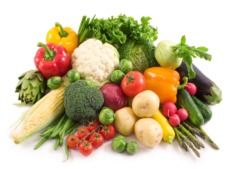Other Vegetables

Onions, shallots, garlic, leaks, spring onions and chives are alliums, part of the lily family. All are grown in the UK and are considered to be a healthy part of the human diet. Garlic is surrounded by folklore with some justification, having a wide range of medicinal properties, including antibiotic status.
It will come as a surprise to supermarket shoppers to know that a large percentage of the current tomato, cucumber, capsicum (peppers) and aubergine crop is now grown hydroponically. The advantage of this system is that one can ensure that the full spectrum of nutrients essential to human health can be delivered to the growing plant and its fruit. The disadvantage is that there is a temptation to only supply that which will produce a big crop and to ignore the human health aspect. So if you suspect that those big tasteless vegetables are lacking something, you are probably right. Go for quality!
Beetroot has recently been promoted to health-food status on the back of some university research which shows that eating beetroot or drinking the juice lowers one's blood pressure. More research is needed to determine whether this reduces heart disease and mortality in the longer term, but it looks promising.
All these vegetables are relatively straightforward to grow and are potentially healthy foods for humans, but we reiterate the fact that you cannot get blood out of a stone. If the growing medium, be it soil or hydroponic, does not contain the requisite minerals, neither will the vegetable.
All vegetables have one flaw. Not one contains Vitamin B12, absolutely essential to human health. For that we need meat.
